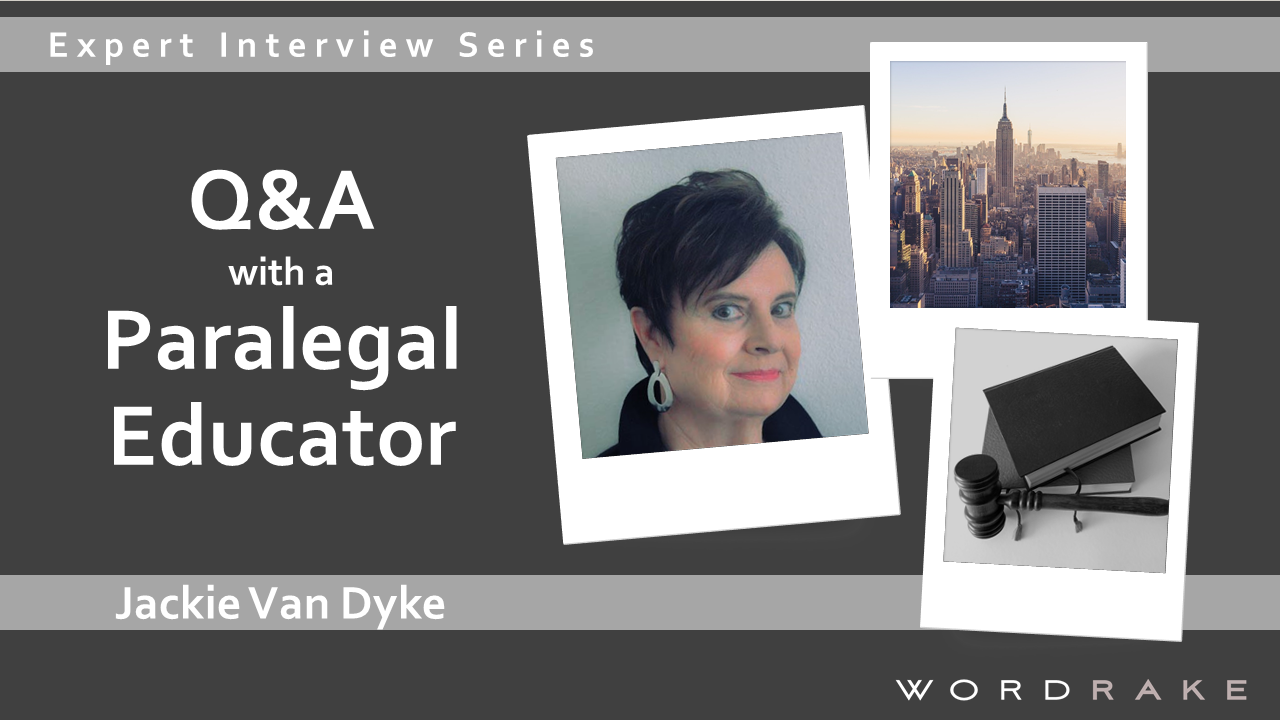Paralegals are key players in law firms and can set the tone for clients. They’re often the first voice or the first face that a client encounters when seeking legal advice. With formal training, paralegals are better prepared to take on that important role. In this interview with certified paralegal and professor of paralegal studies Jackie Van Dyke, she explains the value of training and shines a light on the essential skills paralegals bring to the table.
What is your role and how did you get to where you are today?
I am a certified paralegal, professor of paralegal studies, and the owner and legal writing coach at The Paralegal Writer™ (www.theparalegalwriter.com). I offer writing courses to the paralegal community with a focus on helping paralegals pass the NALA Skills Exam. I am honored to have the opportunity to teach at both my alma maters and to write for numerous paralegal publications. I also appreciate the honor of currently serving on the Continuing Education Council and Paralegal Educators/School Relations Committee for NALA.
What inspired you to teach paralegals? Why do you think formal paralegal training is important?
My instructors at the time I was pursuing my master’s degree in paralegal studies were extremely helpful, encouraging, and generous with their time. Their character inspired me to want to teach paralegals. I believe that formal paralegal training as well as certification provides a validity to our excellence. Law and technology are constantly changing, and we have a duty to ourselves and our clients to be informed.
What are the top 3 skills a paralegal must have for success?
Exceptional writing skills.
Excellent verbal communication skills.
The ability to multi-task.
Do paralegals have a duty of technology competence?
Absolutely! If the ABA requires technology competence from our attorneys, why would we not want to demonstrate the same? With the help of technology, a paralegal’s job is easier, documents can be created faster, and errors can be quickly identified. The ability to organize files and manage voluminous emails can be made simpler with technology competence as well.
What are the most important legal writing and research skills you hope your paralegal students will gain from your program?
In our Advanced Legal Writing course at GWU, the most important skills are (1) writing clearly and (2) editing/revising documents without changing the initial intent or meaning of the content. Avoiding legalese creates clarity. Writing in active voice and using strong verbs make for more interesting reading. I am always hopeful my students will become confident writers and be able to draft a variety of documents in their paralegal careers, supporting their attorneys and supervisors with their critical thinking skills.
In my Legal Research course at the USD School of Law, the most important legal research skill is patience. We must create documents with utmost accuracy. Research takes time and the skill of using a variety of tools within legal databases takes lots of practice.
What role do paralegals play in client communication? What’s the most efficient and effective mix of paralegal and lawyer involvement for client communication?
Paralegals are often the first voice or the first face that a client encounters when seeking legal advice. The paralegal may offer the initial impression of caring and confidence when a potential client reaches out for assistance. A trusting and efficient working relationship between paralegal and lawyer works best for client communication. Each knows their role and responsibility in providing the best legal experience to their client.
What advice would you give to legal professionals who are just starting out in the legal world?
Be patient with yourself and with your learning curve. Ask lots of questions; don’t ever assume. Be a team player. Join a local paralegal association and recognize the importance of networking. Committing to your profession and to others will enhance not only your learning but your credibility as a paralegal.
About Jackie Van Dyke
Jackie Van Dyke, CP, is an independent freelance paralegal in intellectual property and real estate law and the owner of The Paralegal Writer™, an online legal writing community. Jackie is a professor of paralegal studies at the George Washington University (GWU) and a professor of legal research at the University of San Diego (USD) Law School. She has published numerous articles on the topics of legal writing and grammar, and her writing courses are frequently featured in paralegal magazines and on LinkedIn. Jackie serves on NALA’s Continuing Education Council and The Paralegal Educators/School Relations Committee. Jackie earned her Paralegal Certificate in General Litigation at USD and her master’s degree in Paralegal Studies at GWU.
About the Paralegal Interview Series
This interview is part of a collection of interviews about paralegal work. By producing this series, we hope to shine a light on some of the most important but often undervalued people in law: paralegals. Paralegals are key contributors to a high-value legal practice and are more effective when they’re empowered. Let’s start working better together.
Nearly everyone working in a law firm writes, and that writing must be done well. WordRake can help produce better, clearer documents in less time. WordRake is clear and concise editing software designed for people who work with confidential information. The software improves writing by simplifying and clarifying text, cutting legalese, and recommending plain English replacements. WordRake runs in Microsoft Word and Outlook, and its suggestions appear in the familiar track-changes style. Learn more about our paralegal program and our 2-week enterprise pilot. Or try an individual license of WordRake for free for 7 days.






